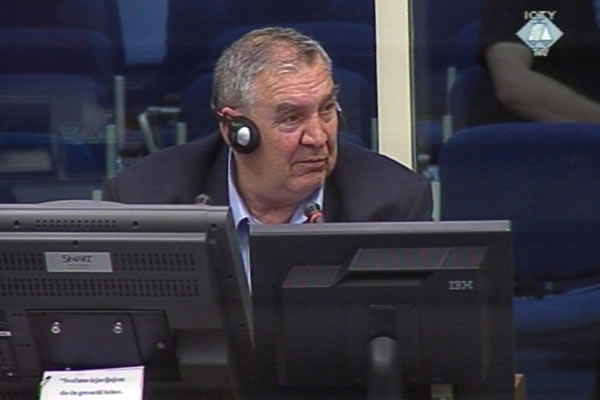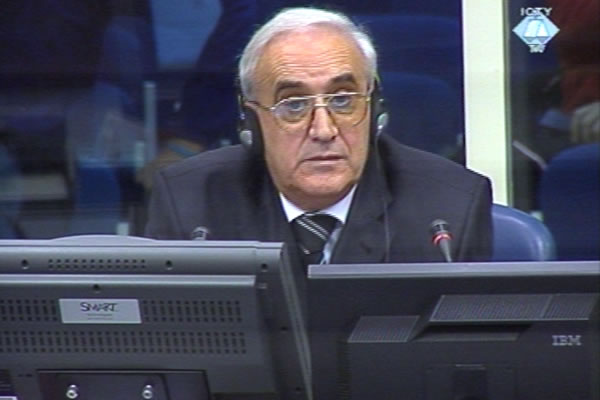Home
KARADZIC: ‘CITIZENS ARE SOLDIERS IN CIVIL WAR’
In the cross-examination of one of the defense witnesses, the prosecutor showed a document indicating that ‘citizens of Muslim ethnicity’ were detained in Vogosca municipality. This prompted the accused to react vociferously, saying they were not civilians because, as it was known, ‘citizens fight in a civil war’
 Zdravko Salipur, defence witness of Radovan Karadzic
Zdravko Salipur, defence witness of Radovan Karadzic After the evidence of a number of former soldiers of the Sarajevo-Romanija Corps, Radovan Karadzic continued contesting the prosecution case about the crimes in Sarajevo by calling two Bosnian Serb politicians. The witnesses are former members of the crisis staffs in the Serb municipalities of Novo Sarajevo and Vogosca, Zdravko Salipur and Svetozar Stanic. They both tried to refute the prosecution’s claim that the Bosnian Serbs were preparing for the war, that they had the support of paramilitary units in the fighting, and that civilians were detained in several locations around the city.
Salipur, who began his evidence yesterday, was cross-examined by prosecutor Gaynor. The prosecutor put it to him that the Serb crisis staffs, including the one in Novo Sarajevo, were established based on the instruction issued on 19 December 1991 to the SDS Main Board in the Holiday Inn Hotel in Sarajevo. The document, known as Variant A and B, envisaged two scenarios for the takeover of the BH municipalities that were claimed as their own by the Serbs. In the municipalities where Serbs were in the majority, they only had to make sure they held all the key posts in the authorities. In places where Serbs were in the minority, they were supposed to establish secret bodies and take over the municipality as soon as an opportunity arose. Witness Salipur claimed that he had never seen such a document. Salipur admitted that a summary of the Main Board’s instructions arrived in Novo Sarajevo, regulating ‘the actions to be taken in chaotic situations’ and that the crisis staff was established afterwards.
The Chetnik military leader from Grbavica Slavko Aleksic was also a member of the crisis staff, the prosecutor argued. The witness didn’t deny it, but insisted that Aleksic was the commander of a regular Bosnian Serb military unit. ‘Aleksic was free’ to do what he wanted, including wear ‘a beard and be called vojvoda,’ Salipur said. Yesterday, Salipur denied that the Serb artillery destroyed the Zuhra Muidovic maternity ward in Sarajevo. This prompted the prosecutor to show footage made by BH Radio and TV network on 27 May 1992, showing the aftermath of the shelling. The rooms and medical appliances were destroyed and newborn babies had to be taken to a safer part of the building. The prosecutor showed an article published by the Associated Press in August 1992. The report states that the maternity ward was destroyed and three babies were killed. The witness denied the claims, saying that it was ‘propaganda’.
The key part of Svetozar Stanic’s evidence referred to prisoner facilities in the Vogosca area. Stanic’s statement to the defense was admitted into evidence; in the statement, Stanic says he knew that Muslim ‘prisoners of war’ were detained in several facilities like such as the two motels, Sonja and Planjine kuce. Prosecutor Tieger showed a document from May 1992 which stated that ‘citizens of Muslim ethnicity’ from the Svraka settlement were detained. When the prosecutor put it to the witness that they were civilians, Karadzic reacted, saying that the word ‘civilians’ was not mentioned at all. The document said ‘citizens’ and it is known ‘that citizens fight in a civil war’, Karadzic argued.
The Trial Chamber decided the remark was inappropriate because it lead the witness to an answer. As the cross-examination continued, the concern was justified, because Stanic’s answers conformed to this argument. He said that the men had been ‘conscripts’. If the interrogation established they were members of the Patriotic League, detainees were sent to the Kula prison. If not, prisoners were set to be exchanged for Serb prisoners. In an attempt to paint the picture in the best possible light, Stanic said that the Sonja motel was ‘comfortable’ and that detainees were interrogated by ‘lawyers’ from Vogosca.
At the end of their testimony, both witnesses expressed their loyalty to their former president. Salipur said he could talk ‘for days’ about the reputation and respect Karadzic enjoyed among the Serbs. Stanic sought permission to shake hands with the accused but his request was turned down. The trial continues on Wednesday.
Photos
Linked Reports
- Case : Karadzic
- 2012-12-17 SHELLING ‘IN EXTREME NECESSITY’, ARMING ‘SPONTANEOUSLY’
- 2012-12-14 EXPLOSIVES EXPERT CONTESTS FINDINGS OF BALLISTICS EXPERT
- 2012-12-13 WITNESS ORDERED HIS SOLDIERS TO USE BOMBS HE KNEW NOTHING ABOUT
- 2012-12-19 ‘MOSES’ FROM GRBAVICA
- 2012-12-20 SUBPOENA FOR JOSE CUTILEIRO
- 2012-12-20 MUSLIM CIVILIANS MOVED OUT ‘VOLUNTARY’

